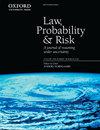歧视的许可证?宗教豁免的实证后果与规范意涵
IF 2.7
4区 社会学
Q1 LAW
引用次数: 0
摘要
宗教豁免的后果是什么?这些结果的规范含义是什么?这些问题目前正处于激烈辩论的中心。反对者认为,给予豁免会扩大LGBTQ歧视。宗教豁免的支持者认为,宗教豁免不会扩大对同性伴侣的歧视。这场辩论令人不安的地方在于,各方都不依赖实际数据。尤其缺失的是关于最高法院判决中授予的豁免的影响的数据,这是最高法院近年来反复处理的一个问题,而且在富尔顿诉费城案(Fulton v. City of Philadelphia)中,这一问题将在本任期内再次得到解决。本文基于一项大规模现场实验的结果介入了这场辩论,该实验测量了杰作蛋糕店诉科罗拉多州民权委员会(2018)对婚礼市场上同性伴侣的影响。实地实验显示,与异性恋夫妇相比,Masterpiece降低了供应商为同性伴侣提供婚礼服务的意愿,即使是在决定之前提供这些服务的供应商也是如此。在杰作之后,同性伴侣遭受歧视的几率估计在61%到85%之间。这些结果对有关宗教豁免的辩论有几点启示。首先,他们质疑宗教豁免的影响可以忽略不计以及豁免不会扩大歧视的论点。其次,研究结果将传统的宗教反对观点复杂化,认为宗教反对是固定不变的,无法改变的。研究表明,即使在没有强制和制裁的情况下,对歧视的需求是有弹性的,是社会建构的。第三,《杰作》的负面影响确立了严格审查宗教负担原则的支柱,表明各州有强制执行反歧视法的迫切利益,没有豁免,以确保进入公共设施。第四,我提出了一种宗教平等冲突的实证方法,可以指导立法机构审议是否以及如何制定反歧视法的宗教豁免。最后,杰作案令人不安的后果要求最高法院在决定富尔顿诉费城市案以及未来任何宗教平等冲突时都要非常谨慎。无论法院如何决定解决手头的宪法问题,它都必须考虑到,即使是故意狭窄和针对具体案件的豁免,也可能对市场及其客户产生重大的负面影响。本文章由计算机程序翻译,如有差异,请以英文原文为准。
A License to Discriminate? The Empirical Consequences and Normative Implications of Religious Exemptions
What are the consequences of religious exemptions? And what are the normative implications of these consequences? These questions are currently at the center of a heated debate. Opponents argue that granting exemptions would extend LGBTQ discrimination. Proponents of religious exemptions argue that religious exemption would not expand discrimination against same-sex couples.
The troubling aspect of this debate is that none of the parties rely on actual data. Particularly missing are data on the effects of exemptions granted in Supreme Court decisions, an issue that the Court has addressed repeatedly in recent years—and is set to do so once again this term, in Fulton v. City of Philadelphia.
This Article intervenes in the debate based on the results of a large-scale field experiment that measured the effect of Masterpiece Cakeshop v. Colorado Civil Rights Commission (2018) on same-sex couples in the wedding market. The field experiment revealed that Masterpiece reduced vendors’ willingness to provide wedding services to same-sex couples as compared with heterosexual couples, even for vendors that provided these services prior to the decision. Following Masterpiece, the odds that same-sex couples would experience discrimination are estimated between 61% and 85%.
These results have several implications for the debate on religious exemptions. First, they discredit the argument that the effect of religious exemptions is negligible and that exemptions will not expand discrimination. Second, the results complicate the conventional portrait of religious objection as fixed and unyielding to change, showing that the demand for discrimination is elastic and socially constructed, even when coercion and sanctions are absent. Third, Masterpiece’s negative effects establish the pillar of the strict scrutiny doctrine of religious burdens, by showing that states have a compelling interest to enforce antidiscrimination law without exemptions to ensure access to public accommodations. Fourth, I advance an empirical approach to religion-equality conflicts that can guide legislatures that deliberate whether and how to enact religious exemptions from antidiscrimination laws.
Finally, the troubling consequences of Masterpiece require the Supreme Court to proceed with great care as it sets to decide Fulton v. City of Philadelphia and any religion-equality conflict in the future. However the Court decides to resolve the constitutional issue at hand, it must take into account that even a deliberately narrow and case-specific exemption might have a significant negative impact on the market and its customers.
求助全文
通过发布文献求助,成功后即可免费获取论文全文。
去求助
来源期刊

Law Probability & Risk
MATHEMATICSSTATISTICS & PROBABILITY&-STATISTICS & PROBABILITY
CiteScore
2.10
自引率
28.60%
发文量
8
期刊介绍:
Law, Probability & Risk is a fully refereed journal which publishes papers dealing with topics on the interface of law and probabilistic reasoning. These are interpreted broadly to include aspects relevant to the interpretation of scientific evidence, the assessment of uncertainty and the assessment of risk. The readership includes academic lawyers, mathematicians, statisticians and social scientists with interests in quantitative reasoning.
The primary objective of the journal is to cover issues in law, which have a scientific element, with an emphasis on statistical and probabilistic issues and the assessment of risk.
Examples of topics which may be covered include communications law, computers and the law, environmental law, law and medicine, regulatory law for science and technology, identification problems (such as DNA but including other materials), sampling issues (drugs, computer pornography, fraud), offender profiling, credit scoring, risk assessment, the role of statistics and probability in drafting legislation, the assessment of competing theories of evidence (possibly with a view to forming an optimal combination of them). In addition, a whole new area is emerging in the application of computers to medicine and other safety-critical areas. New legislation is required to define the responsibility of computer experts who develop software for tackling these safety-critical problems.
 求助内容:
求助内容: 应助结果提醒方式:
应助结果提醒方式:


